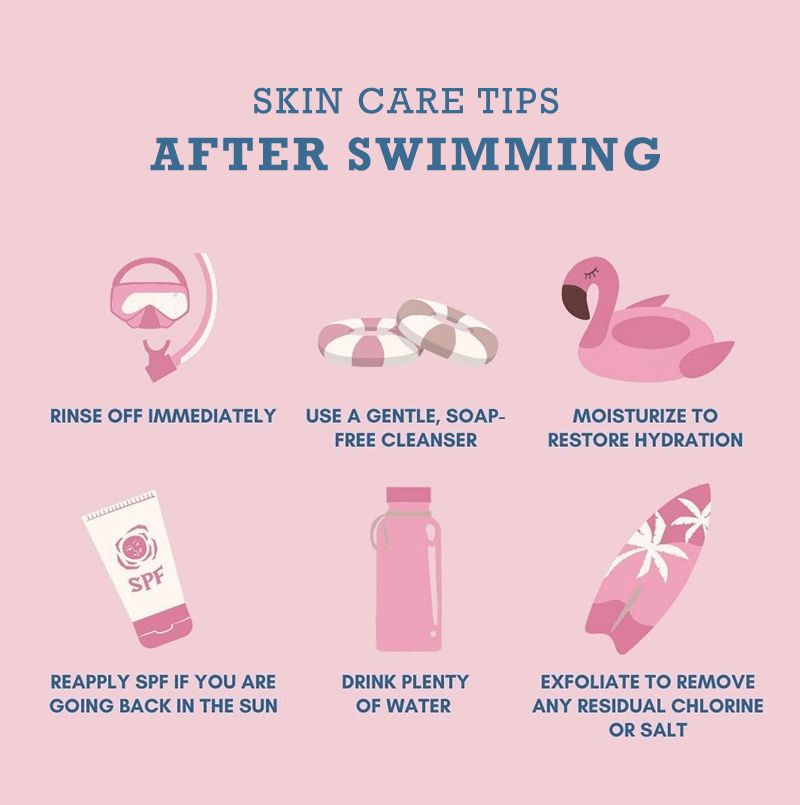Swimming, besides being a life skill, is one of the fun-filled activities that help maintain physical fitness. But wait! It affects the skin and hair too. Yes, spending too much time in the pool causes more than just pruney fingertips! It happens not only because of the sun but also due to the presence of chlorine in water. And that is the reason most people refrain from indulging in swimming because of the chlorine-treated pool and the skin irritations that follow. Let’s dive into some swimmer skin care tips surrounding this topic.
No doubt, chilling by the lovely pool with a refreshing cooler is an amazing way to enjoy the season. But ever had itchy skin after swimming in a pool? It is because chlorine is added to swimming pools to disinfect and prevent the rise and spread of bacterial, viral and protozoan diseases. Chlorine and other chemicals can be harsh on your skin, leading to dryness, rashes, itchiness and irritation. And in case you are taking a dip in seawater where you may find salt and pollutants too, you will have to take extra special care.
Scroll down and check how dermatologists recommend caring for your skin before and after a swim.
ALSO READ- Stubborn Belly Fat- Possible Causes & Reasons
Swimmer Skin Care Tips (BEFORE)
The first and foremost concern should be the selection of the right pool. Some pools are loaded with chemicals which are extremely bad for the skin. Before diving into any pool, just ensure that the water is frequently changed and hygienic too.
Also, if possible, avoid indoor swimming pools as they are not very well-ventilated and trap the gasses from the chemicals. This causes even more skin problems, therefore, always try to opt for an outdoor swimming pool.
Rinse Before Entering
Make sure to rinse before entering a pool or sea water because doing so is not only important for you but it also does a favor to your fellow swimmer. Wondering how? Let me explain-
When you go for a dip without taking a shower, chances are you are swimming in perspiration, lotions, urine and faecal matter, and any other microbes found on your skin and hair. Gross! As per studies, on average, people have about 0.14 grams of faeces on their bodies. And swallowing even a small amount of faecal-contaminated water can make you sick. So by not showering, you put yourself and others at risk of contracting waterborne illnesses such as diarrhoea, swimmer’s ear and skin infections.
Rinsing before entering a pool means the chlorine in the water won’t have to work as hard, and more illnesses can be prevented.
Slather On Some SPF
Sunscreen is key for staying safe during summertime activities. Sun exposure can cause sunburn, skin ageing, and increase the risk of skin cancer. And when you’re swimming, you’re at an increased risk of exposure since the water can reflect the sun’s rays onto your skin. Therefore, SPF protection is something you shouldn’t miss out on, whether you’re swimming in direct sunlight or in the wee hours of the day.
Sunscreen is most effective when applied liberally 30 minutes before going into the water. Make sure to dry your skin off before you apply your sunscreen. Once you apply it, you should give your skin 20 minutes to absorb it. Always go for a sunscreen with an SPF of at least 30 and that’s labelled as ‘water-resistant’ or ‘very water-resistant’ as these sunscreens are formulated to stay on your skin even when you’re in the water. Don’t skimp on sunscreen! Reapply every two hours.
*You may also add Vitamin C, an antioxidant to your regimen as it protects the skin against UV damage. Application of topical Vitamin C inhibits tyrosinase (melanin-producing enzyme) in the skin and thus reduces sun tan.
ALSO READ- DIY Sun Tan Removal Face Packs For Clean And Clear Skin
Use A Lip Balm
Don’t forget your lips! Wearing a lip balm with SPF is a way to go as UV rays are really harsh for your sensitive lips. Not only this but spending long hours in chlorine-treated water can contribute to cracked lips. Therefore applying a water-resistant lip balm before swimming will keep your lips moisturized and protected. This provides a protective barrier between your lips and the water.
Even if you are swimming indoors, make sure to use a lip balm to prevent dryness and subsequent bleeding after you’re out of the pool.
ALSO READ- Homemade Lip Scrubs For Soft And Pink Lips
Invest In A Swim Cap
While taking care of your skin, do not forget to protect your hair. Use a well-fitted swimming cap to keep your hair from getting into direct contact with the water as much as possible! The swim cap is used to keep your hair healthy and prevent it from getting all dry and lifeless. It will keep dirt and other particles out of your hair which could cause irritation later on in the day. Using a swim cap will also help you to avoid your loose hair strands from floating away too! For further protection, you may apply oils and conditioner to your hair.
ALSO READ- Dimple Kapadia Hair Care Secrets Revealed
Never Neglect Sunglasses
Generally, most people use sunscreen under the eyes. But I would suggest avoiding applying it under and wearing well-fitted swimming glasses instead. This will also help reduce damage to the eyes from sunlight.
Keep Yourself Hydrated
Sip on some water to ensure that your skin is necessarily hydrated while swimming. This is because dehydrated skin is likely to feel dry and rough. Hydrated skin stays supple on the other hand. This also helps in purifying the skin, replenishing lost moisture, and flushing out chlorine or other toxins.
ALSO READ- 8 Traditional Summer Drinks To Keep You Cool
Swimmer Skin Care Tips (AFTER)
Take A Quick Shower
To remove all the dirt and pathogens which have accumulated on your skin while swimming, take a quick shower. Use a gentle body wash. Bathing after swimming is a must to cleanse your body thoroughly. Start off your shower with warm water. This will help open up your pores to allow for a thorough cleansing. Finish by turning the shower to cool water to help tighten your pores.
Shampoo Is Must
To eliminate the chlorine buildup in your hair by swimming make sure that you use a cleansing shampoo. Go for sulfate and silicone-free shampoo and conditioner. This will clean your scalp and make them lighter and healthier.
ALSO READ- Shilpa Shetty Kundra Diet Secrets
Pat Your Skin Dry
Don’t let your skin air dry after swimming because it may cause more dryness. After showering, dry your skin with a towel. But avoid rubbing your skin dry with a towel after rinsing, gently pat it dry. Rubbing your skin too hard can cause irritation and remove any protective oils that may be on your skin. Patting your skin dry can help prevent skin damage and keep your skin hydrated.
Apply Talcum Powder
Those who swim regularly can feel a peculiar smell in their body. So, to avoid that, apply talcum powder especially in the inner portions of the body like armpits. This will keep you fresh for a long time and help you dry off quickly. Remember, a little talc goes a long way. It will also help absorb any residual chlorine that might be present on your skin
Don’t use the talc on the parts of your body that you need to moisturize.
ALSO READ- Water Rich Fruits To Stay Hydrated In Summer

Moisturise
Skin nourishment is important both before and after swimming for chlorine rash prevention. When the skin is damp, apply a thick layer of moisturizer or oil. This is because chlorine in pool water is very drying on the skin. You need to moisturize immediately. Invest in a good hydrating moisturizer and use it regularly to ensure that your skin stays healthy. Top this off with SPF again.
Exfoliate
Exfoliating the skin once a fortnight can help to remove built-up dirt and pigmented dead skin cells. This can reduce the appearance of dark and dull-looking skin. Using a gentle scrub will give you smooth and soft skin immediately. If you are a regular swimmer, go for chemical exfoliators containing hydroxy acids. They work great by dissolving dead skin cells.
ALSO READ- DIY Lemon Facial Scrub: For Oily, Dry And Normal Skin
Avoid Tight Clothing
Avoid wearing tight clothing as it rubs against your skin and causes irritation after swimming. Always opt for loose, breathable clothing that won’t constrict your skin. This can help prevent skin irritation, keep skin healthy, hydrated and allow your skin to breathe.
Stay Hydrated
Swimmer’s definitely get dehydrated because they still sweat in the water. Dehydration is associated with cramping, dizziness, headaches, and sluggishness.
So, even after your swimming session, it is necessary to stay properly hydrated and replenish what you’ve lost. You can also have herbal teas as this will help relieve the stress of oxidative damage on your skin.
ALSO READ- Green Tea: What Are Its Advantages And Disadvantages?
Care For Your Swimwear
Keeping your swimwear, goggles, and swim cap clean is a vital part of maintaining your skin health. Therefore don’t forget to rinse them as chlorine can damage accessories too. As far as your swimwear is concerned, you may add about a tablespoon of vinegar to your wash. This will not only help neutralize the chlorine smell but will also help maintain the colour of the fabric.
By following these swimmer skincare tips, you can help reduce the risk of skin irritation, hydrate and soothe your skin, and keep it looking and feeling healthy.
